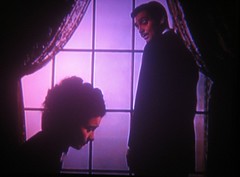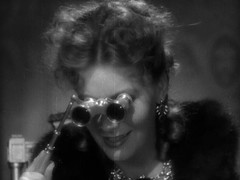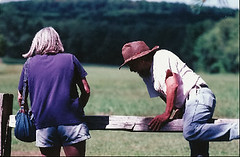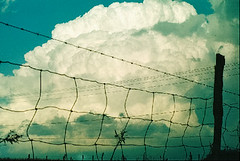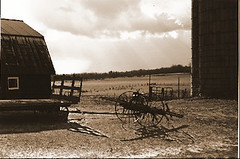Gone With the Wind (1939)
Dir. Victor Fleming
Writ. Based on Margaret Mitchell's novel, and Sidney Howard's screenplay w/ no credit to Ben Hecht, David O. Selznick, Jo Swerling, John Van Druten
w/ Vivien Leigh, Clark Gable, Olivia de Havilland, Leslie Howard, Butterfly McQueen
The mixed reactions this film's very mention usually elicits from folks holds both merit and misconception. Certainly this is a film dealing in most part with the South and the Civil War and all of its various repercussions, but darker elements at play here involve, mainly, the roles of women in an ever-changing and often hostile, unpredictable setting. Southern dramas all the way back to colonial times usually seem to involve sniping women who take potshots at each other hushedly but must maintain a colossally gracious poker face while among polite society. To do anything else could disgrace the family name or, worse, pull their most hidden thoughts into the open, allowing society to dismiss them as the imps that the very system essentially renders them. Adding to this ridiculous and frustrating social paradox, their roles don't get better after they get the men they're trying to, as in order to get what they want from their husbands, they must resort to sexual manipulation as though it were course de nature. In this context, the women never seem to develop any real maturity, strength of character, or lasting independence from the vulgar, tasteless monopoly that tradition and the unchecked power of male dominance has handed to them like a plaything. In this sense, slavery gets expanded to the context of all Southerners, but especially to that of females. It's just social custom that if a woman wants to be thought of as such that she must constantly prove her powers of conquest, whether she does so openly or not.
That being said, while most historians may agree that women and children are the first and foremost victims of war, in the case of Scarlett Katy O'Hara quite the opposite is true. The war is in many ways her freedom and her grace. It provides the distraction required for her to detach from a pre-ordained role and outgrow it in leaps and bounds. That's not always obvious while watching the rash little vixen, of course. Vivien Leigh pursues the less likeable qualities of the often dubious heroine with gusto, a gale force to be reckoned with at every turn of the camera. And my, oh my: the camera guy had his work cut out for him. Watching her sometimes it's not hard to think that she really might be on coke or at least some seriously concentrated ephedrine. Somewhere between her doting father who'd do anything to try and make her life more harmonious and her more rigid mother who'd prefer her daughter just make her proud, though, Scarlett has some hope to turn her life around and stop embarrassing them.
Clark Gable as Rhett Butler -- a role that actually was auditioned for by Reagan (though God only knows why, I guess) -- seems to find her utterly charming while at the same time being fully aware of her stupefying number of flaws. He courts her, wins her, and marries her at last. Unfortunately for him, it's just not all necessarily in that order. His oblivious wife pines for another woman's husband, a longtime family friend that never had any interest in her beyond that of the familial. Olivia de Havilland, possibly one of the old screen's most overlooked and forgotten pearls of wisdom, reigns supreme as the understatedly compassionate woman who knows of Scarlett's covetousness and befriends her genuinely, and stays beside her even as Scarlett tries to coax the woman's husband away from her. All in all, it makes for compelling drama, just in case the War itself isn't enough of an eye-opener, but Rhett's heels cool by and by and, after their daughter dies, he packs up and leaves Scarlett to sort out her own mess while she's still in mourning...a really poignant moment.
A slave to herself, she's left to cope with the atrocities of war as she tries to run a household, stay alive, and keep what's left of the family intact. Thus becomes the grasshopper an ox. Four hours may seem like a long time to watch a movie (222 minutes, to be precise) and there's no denying that it is, but a lot of ground gets covered. After all, we have evil carpetbaggers to reckon with, the effects of the war to absorb, and a lot of the after-effects, too. Butterfly McQueen, playing house servant Prissy so well that most can't tell she's acting, becomes more and more mesmerized by a make-believe world that she slips into to escape the gruesome and demanding realities of a Georgia thrust into chaos and a household driven to ruins.
If there's any relationship that Margaret Mitchell understands, it's one of predator and prey. The carpetbaggers prey on the south's stately beauty, undermining that old, reliable sense of faith in one's neighbors, and essentially what the authoress has done is canonize Southern women as survivors of a sexual Holacaust and a war that General Lee never bothers to show up and apologize for. She leaves the area of slavery practically alone, perhaps thinking that the larger issue was the plight of women. Slyly insinuating the slaves of the day as sexless, mindless beings could prove to be better commentary than any really blunt exploration of the issue may have provided. It is possibly more important that the women who form the focus of the story are so unaware of why the war is even being fought or how important it is to so many people. It speaks to their belittlement, the darkness that they have been kept in by men who felt ignorance would be the best way to run a household. It also stays true to the Southern culture itself, which had little interest in the outside world but wished to establish itself as aristocracy or at least landed gentry. What we're left with as a result of this comparatively small mindset is a sense of real nerve and real backbone. After Lee's and Sherman's troops have decimated the countryside, the women -- and even Scarlett herself -- take to the infirmaries to care for the sick and then, eventually, return to the land, their heritage, and their dignity.
